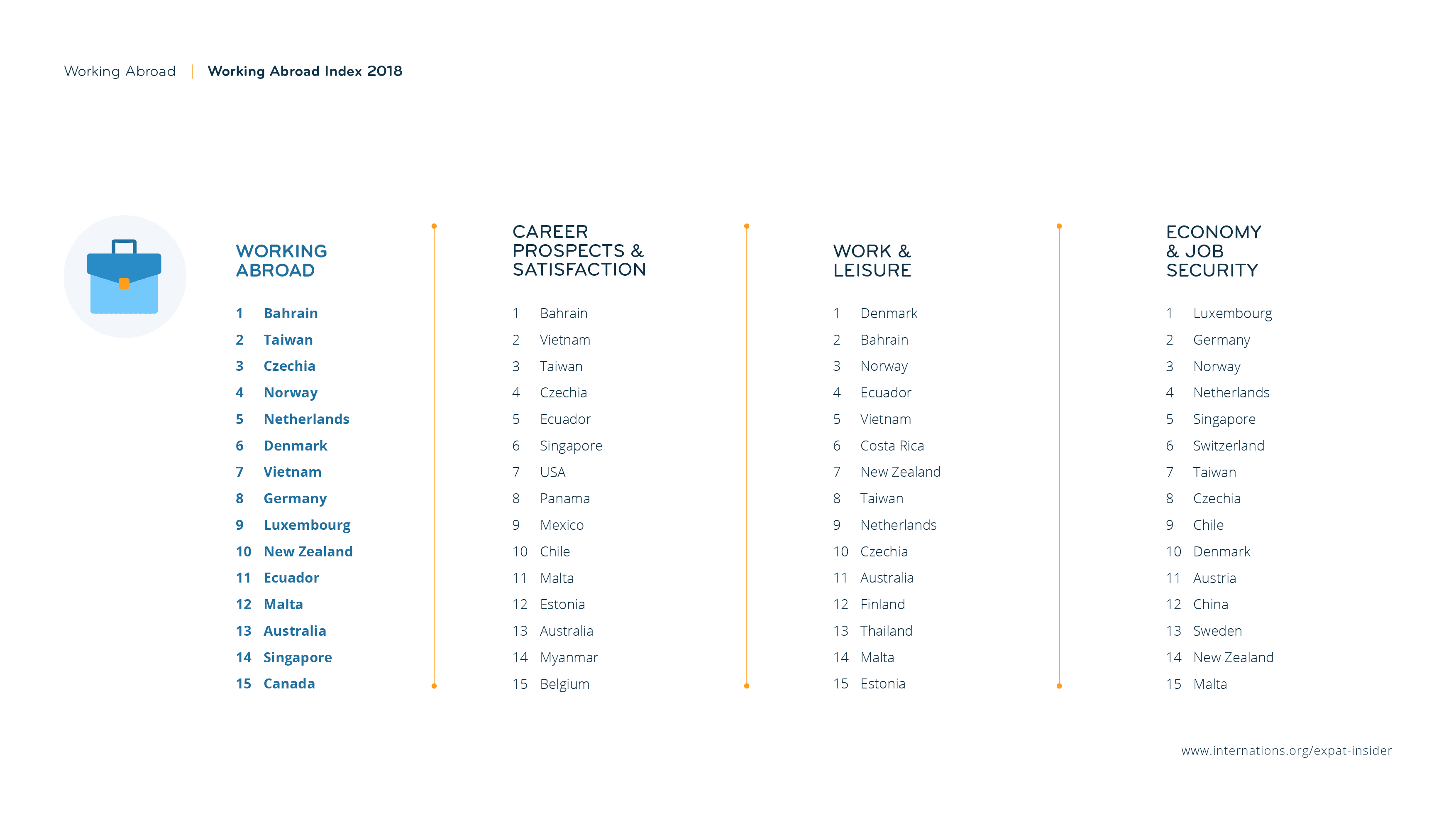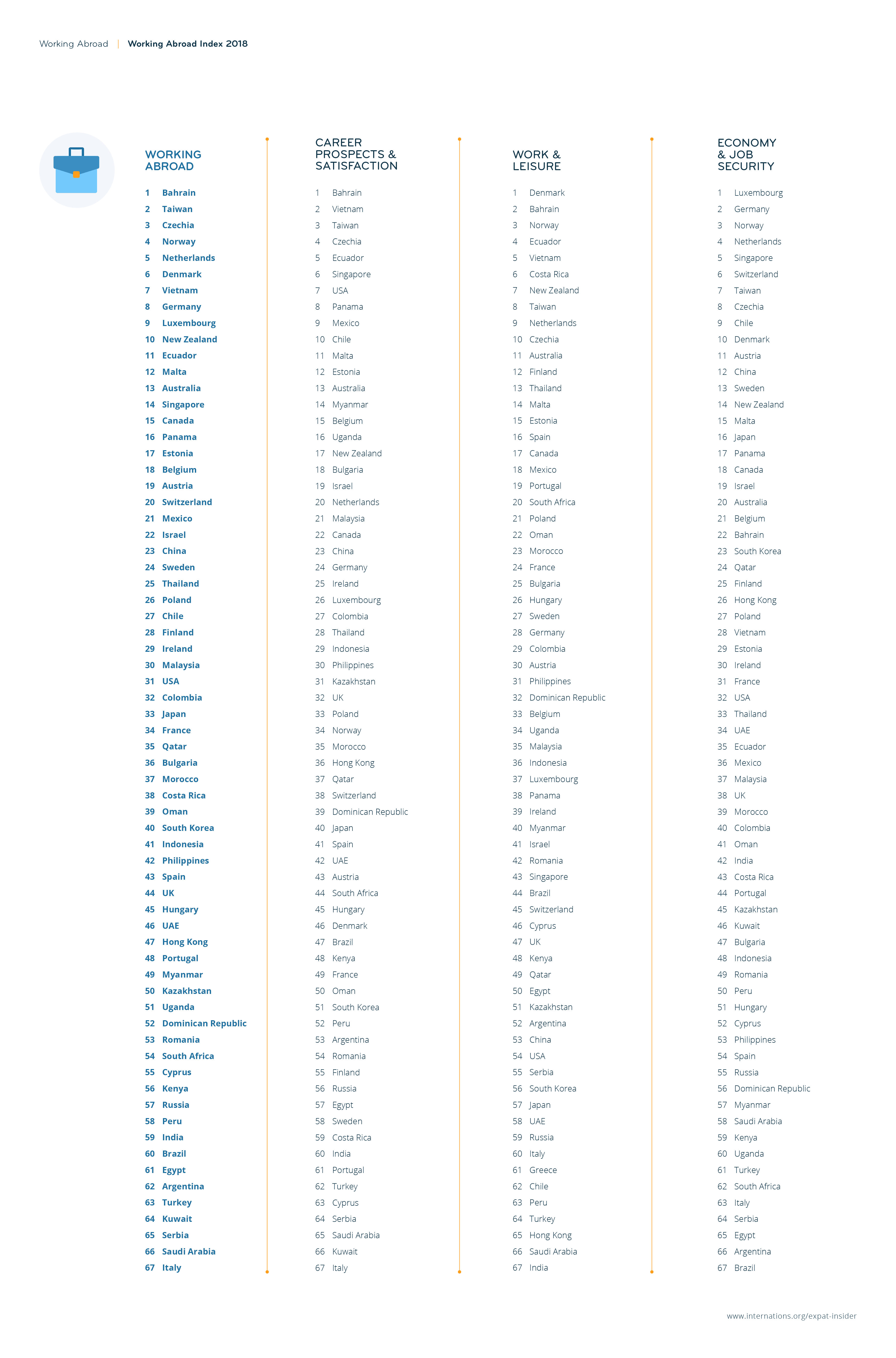The Best (and Worst) Places for Working Abroad
The biggest winners in the Working Abroad Index impress with an improved work-life balance and better career opportunities.
- Expats in #1 Bahrain appreciate the country for its career prospects.
- #2 Taiwan shows impressive results in the Work & Leisure subcategory.
- #3 Czechia does particularly well for job security.
- Biggest winners: Ecuador, Japan, and Israel.
- Biggest losers: Romania, Kazakhstan, and Costa Rica.

Methodology
The Working Abroad Index covers various factors from three different subcategories: Career Prospects & Satisfaction, Work & Leisure, and Economy & Job Security. Each factor was rated on a scale of 1 (very good) to 7 (very bad). The index lists 68 countries with at least 75 respondents each.
(Not So) New in the Top 3
Little has changed in the top 3 of the Working Abroad Index: Bahrain, 2017’s number three, and Czechia, 2017’s number one, have traded places in 2018. Taiwan is making a comeback in the top 10, climbing from 12th to 2nd place, which it also occupied in 2016.
Bahrain has shown a significant upward trend: coming in 37th place in the first Expat Insider survey in 2014, the country steadily improved its position in the Working Abroad Index until it made its first appearance in the top 10 in 2017. Expats are particularly happy with their career prospects in the Middle Eastern country, and 30% are even completely satisfied, twice as many as the global average. With oil prices recovering and the discovery of further oil and gas reserves in Bahrain, the economic future looks bright for the little country. Working hours are rather long in Bahrain (an average of 45.2 hours a week, full time), and the vast majority of expats (94%) works full time. That being said, nearly six in seven respondents in Bahrain (85%) generally rate their job satisfaction favorably, 20 percentage points more than the global average.
It is easy to deal with employers in Taiwan, as long as you do a good job.
Taiwan receives positive results across the board, landing in the top 10 of the Working Abroad Index for almost all factors. Over three-quarters of the respondents in Taiwan (76%) are generally satisfied with their job security. One survey participant from the Philippines points out that “it is easy to deal with employers there, as long as you do a good job.” In the Work & Leisure subcategory, the East Asian destination also doesn’t disappoint: 34% are completely satisfied with their working hours, and more than three in ten (31%) give their work-life balance the best possible rating. This might have something to do with the fact that expats in Taiwan work fewer hours per week than the global average (39.9 vs. 44.0 hours in full-time jobs).
Freelancing is easy in Czechia, and a little bit of money goes a long way.
Job security is also highly appreciated by expats in Czechia: more than seven in ten expats (71%) rate this factor favorably, compared to a global average of 59%. Moreover, 31% are very satisfied with the state of the economy. “Freelancing is easy here, and a little bit of money goes a long way,” a US expat points out, while a French survey respondent is grateful for the career opportunities: “I actually have a job instead of being unemployed.”
In fact, economic forecasts for Czechia in 2018 predict stable growth as well as a lack of qualified employees in many fields. This does not only offer job opportunities for expats in various sectors, but it might also lead to a rise in salaries.
Biggest Winners: Positive Career Prospects and a Balanced Working Life
In 2018, Ecuador, Japan, and Israel qualify as the three biggest winners in the Working Abroad Index. Rising 40 ranks from 51st place in 2017 to 11th in 2018, Ecuador is not just the top winner in this index, but also one of the biggest winners overall. Within one year, Ecuador has climbed from 62nd to 2nd place for career prospects, with 69% of expats rating this factor positively. The overall job satisfaction among expats has improved by 40 places, with 71% favorable ratings. Ecuador seems to have recovered from the 7.8-magnitude earthquake in 2016, which, together with low oil prices, affected the economy negatively. In 2018, experts expect an economic growth of 2.5%.
Israel, the third-biggest winner in this index and one of the biggest winners overall, has advanced its position by 21 ranks, from 43rd to 22nd place. Although Israel’s results in the Work & Leisure subcategory remain rather mediocre, this is one of the areas where the country has improved the most. Ranking 39th out of 68 for work-life balance in 2018, Israel has climbed 20 places and receives 62% positive responses for this factor. Israel’s working hours also get more positive feedback in 2018 than in the year before. Although the average full-time working hours per week have slightly increased from 43.9 to 44.3 hours, three in ten expats work part time, compared to 25% in 2017. The country moves to 43rd place for this factor, with another 62% of positive ratings.
Japan also shows significant improvement across all factors in the Working Abroad Index. The country has climbed 24 places for overall job satisfaction and 14 for career prospects as a single factor. Job security is another big plus for expats: with 65% being generally satisfied with this factor in 2018, Japan has gained 17 places.
After featuring among the bottom 10 in the Work & Leisure subcategory since 2014, Japan gets more positive responses for its working hours in 2018: it now ranks 54th out of 68 for this factor. The average full-time working hours in Japan have decreased from 46.9 hours per week in 2017 to 42.9 hours per week in 2018, which might be a reason for this result. Despite this silver lining, a proper work-life balance remains a dream for many expats in Japan. One Russian survey respondent says: “My husband is always working. On the weekend, he only has the energy to sleep because he is so exhausted. I might as well live alone.”
Biggest Losers: Long Working Hours and Little Job Security
The biggest loser in the Working Abroad Index is Romania. The country has lost ground across all factors, but most of all for overall job satisfaction, dropping by 51 places. In fact, 23% of expats rate this factor negatively, with one in seven (14%) giving it the worst possible rating.
After significantly improving its rankings for working hours and work-life balance in 2017 — Romania had gained 23 and 28 places, respectively — the country achieves poor results for these factors in 2018. In fact, one in five expats rates their work-life balance in Romania negatively, and 15% are generally unhappy with their working hours.
In 2017, Kazakhstan was one of the biggest winners in the Working Abroad Index and featured in the top 10 for the Career Prospects & Satisfaction subcategory. In 2018, however, the country only ranks 50th in the index. The country is down by 19 places for its working hours, with 26% of expats being unhappy with this factor. The vast majority (96%) works full time for an average 49.7 hours per week — almost six hours more than the global average (44.0).
Although the country still does better than the bottom 10 for job security, it shows a significant change for this factor. While it made it to 9th place in 2017, Kazakhstan only occupies a below-average 37th place in 2018. One in five expats gives their individual job security a negative rating.
There are not enough job opportunities for the young in Kazakhstan.
Kazakhstan has also dropped from ranking 1st in 2017 to 22nd in 2018 when it comes to career prospects: 18% rate this factor negatively. A British survey respondent points out that “there are not enough job opportunities for the young”. The overall job satisfaction is also at a new low, with nearly one in six survey respondents (16%) generally unhappy with this factor.
A lack of job satisfaction also plays a role in Costa Rica dropping to 38th place in the Working Abroad Index, with 19% generally unhappy with this factor. Career prospects also seem to be less than great for expats living in Costa Rica: more than one in three (35%) are generally dissatisfied with this factor. “I have not been able to find a job in the last five years because I’m overqualified,” says one expat from Peru.
The country is doing better with regard to work and leisure. It ranks 12th for working hours (compared to 14th in 2017) and 7th for work-life balance, making it into the top 10 for the latter. A Canadian survey respondent praises Costa Rica for its “pura vida lifestyle”, while a participant from the US appreciates the country for its “no-stress way of life”.
Full Ranking

Further Reading
- The National. Bahrain economy to grow 3.7% in 2018 with outlook revised as oil rebounds, BMI says. 2 Apr 2018.
- The National. Bahrain’s largest oil discovery since 1932 ‘can be a game changer’, economists say. 2 Apr 2018.
- Deloitte. Czech economy in 2018: Stable growth with signs of overheating. 4 Jan 2018.
- Devdiscourse. IMF projects 2.5 percent growth in 2018 and 2.2 percent in 2019 for Ecuador. 17 Apr 2018.
- Expat Insider 2018 — Career Opportunities: Bahrain, Ecuador, and Vietnam Are the Best Bet
- Expat Insider 2018 — Living the High Life in Czechia
- Expat Insider 2018 — Sun in One Asian Tiger State, Rain in Another
- Expat Insider 2017 — Finding the Balance: Where Working Expats Are Happiest
- Expats in Bahrain
- Expats in Taiwan
- Expats in Czechia
- Expats in Japan
Advertisement
Join InterNations
The community for expats worldwide
Download

